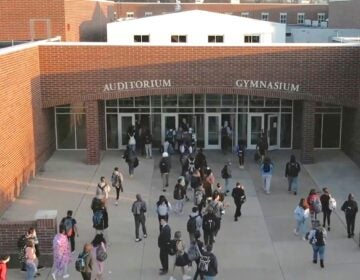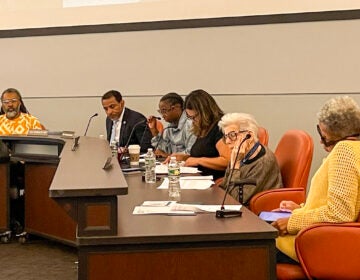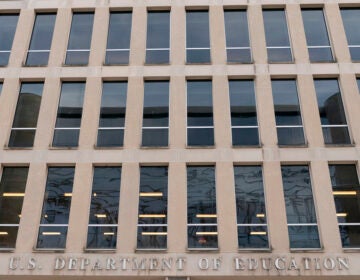Child care centers fill the void for Delaware students learning remotely
State officials are grateful to the facilities who stepped up for school-age kids, and have allocated $1 million in grants to help centers defray costs.
Listen 4:29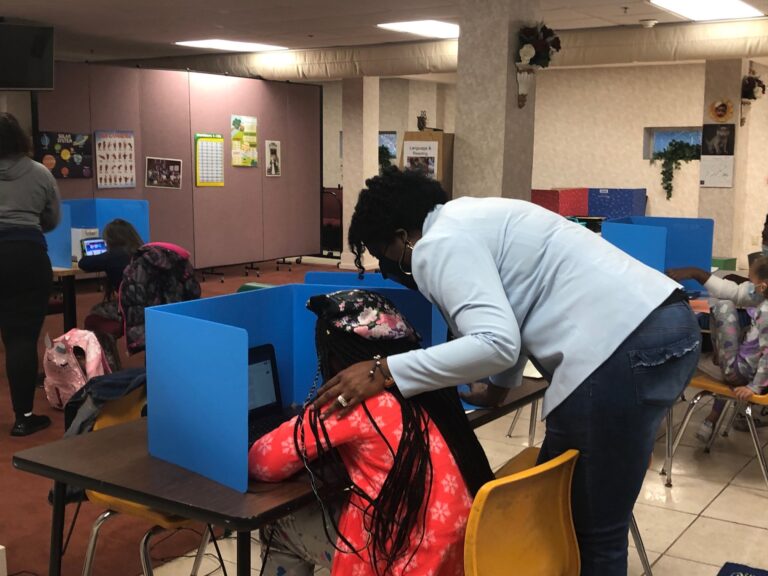
A Leap of Faith owner Melanie Thomas-Price works with fifth-grader Cameryn Jones. (Cris Barrish/WHYY)
Jalessa Robinson leans over a little girl to help her with some simple addition. She’s one of 10 students, in kindergarten through fifth grade, working online at A Leap of Faith child care in Wilmington.
The kids are several feet apart while they take classes via Zoom, Schoology and other online learning platforms.
“Two plus two is what?” Robinson asks as the child stares at the screen and thinks. “Count them. Count them.”
“One. Two. Three. Four,’’ the girl responds in a tentative tone.
“Two plus two is four!’’ exclaims Robinson. “Good job.”
It goes like this all day, as Robinson and other staffers monitor the school-age students and try to keep them on track.
The scene at A Leap of Faith is one that’s replicated daily at dozens of child care facilities throughout Delaware. That’s because when most Delaware public school districts chose remote-only learning to start the school year in September, hundreds of families with working parents turned to these facilities to provide a setting for online education.
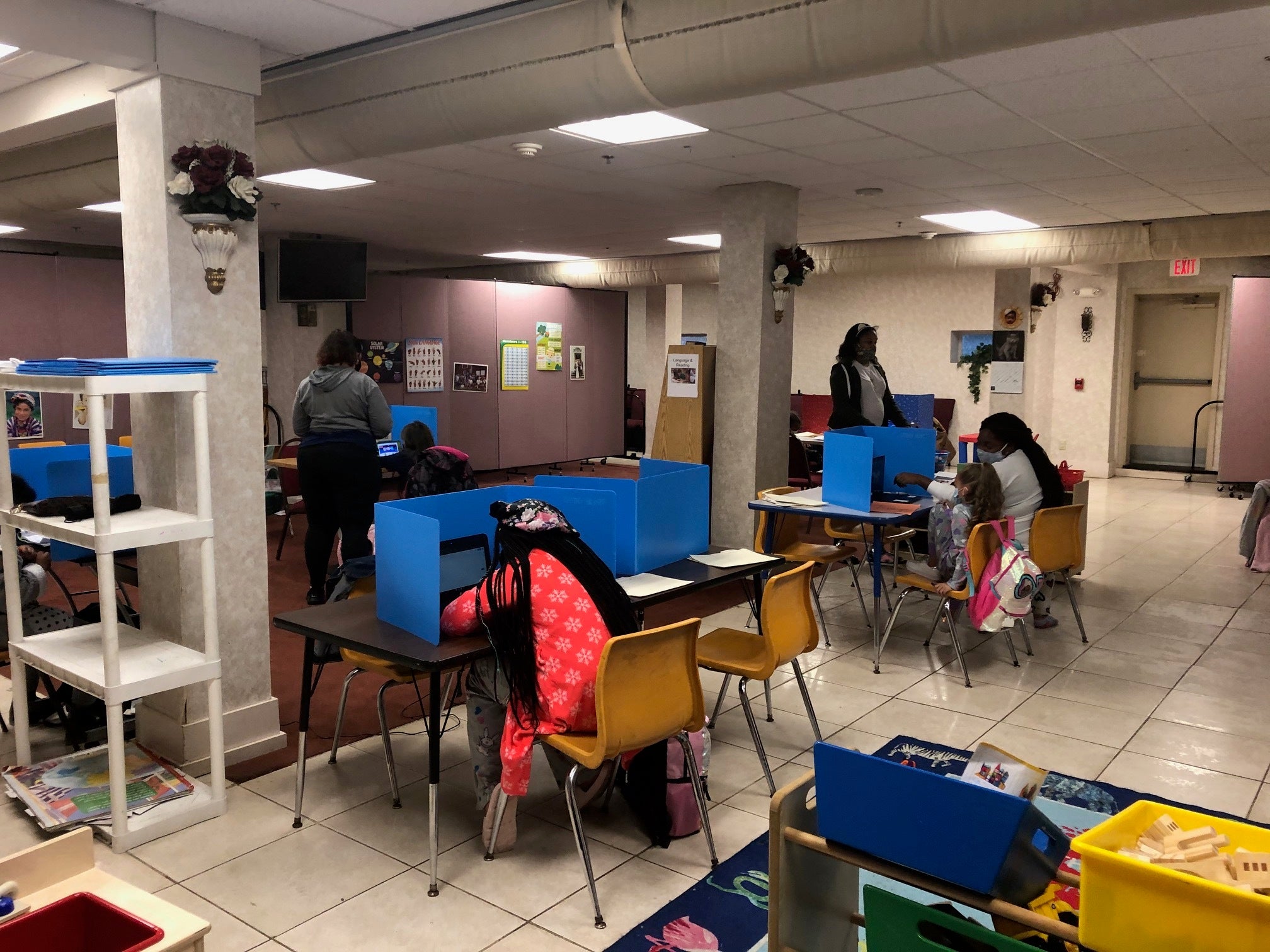
The Carney administration is grateful, and now the state is offering to reimburse facilities for the additional expense of pitching in during the pandemic. This week, the state allocated $1 million from its federal CARES Act money to assist centers serving school-age children. They can get reimbursements of $500 to $7,500.
“Providers have stepped up to fill an important need for Delaware families,” Carney said. “I’ve seen firsthand the challenge these child care providers are dealing with to support remote learning.”
Daphney Walker, program director at A Leap of Faith, told WHYY News it’s a juggling act for the center, where almost every child is from a low-income family. Kids bring computers that aren’t charged or have connectivity issues. Some students have behavioral issues and need frequent breaks. There are younger ones who don’t even know how to work a computer mouse, or understand the basic concepts being taught, Walker said.
“The teachers have to be right there beside some of the children because they are not able to carry out the instruction of the teachers at their school on Zoom.”
She gave the example of a kindergartener who was being asked to add 528 plus 15.
“Some of these children don’t even know what the number 10 is,’’ she said.
Kim Krzanowski heads the Office of Early Learning in the state Department of Education. She echoed Carney in appreciation for the burden borne by the many centers who have stepped up for education.
“They were seeing that they would have to increase their bandwidth, internet,’’ Krzanowski said.
“They were seeing that they would have to buy different furniture to fit larger children, older children. Their supplies, you know, the paper, the printing, the ink.
“And then staffing was another consideration for this. You have to have more staff to safely monitor children who are on electronic devices.”
‘When I’m here I have to stay on plans’
With COVID-19 still spreading steadily throughout Delaware, Gov. John Carney isn’t close to allowing full in-school learning. Currently, only hybrid — a mix of in-person and online classes — is permitted. So the makeshift classrooms at child care centers will be needed for the foreseeable future.
Melanie Thomas-Price runs A Leap of Faith, which has two facilities, both in Wilmington. Her centers have as many as 36 school-age kids on any given day. She’s grateful for the chance to receive the stipend and defray the extra costs for staff, supplies and other necessities, such as greater bandwidth.
“I think our biggest challenge was with the internet early on,’’ Thomas-Price said. “The reception wasn’t strong enough, so we were up and down trying to keep them online. So what we had to end up doing was going through our internet carrier, and we spent thousands of dollars just getting new lines and getting a stronger internet service.”
Fifth-grader Michael Colon is delighted to get the attention at A Leap of Faith.
“I like it,’’ the youngster told WHYY News after working on his reading lesson online. “They actually help me when I need help, like when I raise my hand.”
Getting assistance with his fractions in math class has been a blessing for Colon, he said.
“We’re doing mixed numbers. How to add them, subtract and change the denominators,’’ he said.

Fourth-grader Cameryn Jones enjoys the controlled setting.
“When I’m at home I get distracted by the TV and when I’m here I have to stay on plans,’’ Jones said.
Not that it’s always easy.
“When you are on Zoom you can’t stay focused that much. But when you are in real school you have to listen to the teacher and do the answers and do your work,’’ she said.
Walker says her staff uses several measures to keep kids with special needs on track.
“They are not used to having to be at school or on the computer all day,’’ she said.
“They get tired. They don’t want to just sit there so we had to come up with a plan where we would take them out for a break, let them walk, drink water, go on the playground, walk around and come back in.”
Delaware Education Secretary Susan Bunting says these strategies and others are appreciated.
“These centers and homes are providing students a safe environment in which to engage in remote learning while their parents work in order to provide for their families,” Bunting said. “We are grateful for their contributions to our state and our children every single day.”

Get daily updates from WHYY News!
WHYY is your source for fact-based, in-depth journalism and information. As a nonprofit organization, we rely on financial support from readers like you. Please give today.




![CoronavirusPandemic_1024x512[1]](https://whyy.org/wp-content/uploads/2020/03/CoronavirusPandemic_1024x5121-300x150.jpg)
